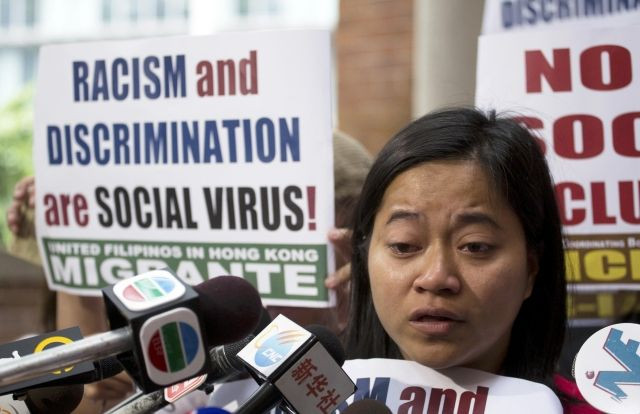Hong Kong Top Court Denies Permanent Residency For Foreign Domestic Workers

In a landmark decision, Hong Kong’s apex court ruled Monday that foreign domestic workers were not eligible to seek permanent residency in the city.
The ruling, which ended a two-year legal battle, in a case involving Evangeline Banao Vallejos, a Filipino maid who has worked in Hong Kong for more than 17 years, dashed the hopes of several hundred thousands of foreign domestic helpers from gaining permanent residency in the territory.
"The nature of foreign domestic helpers' residence in Hong Kong is highly restrictive," the judgment stated, as reported by Reuters news agency. "The foreign domestic helper is obliged to return to the country of origin at the end of the contract and is told from the outset that admission is not for the purposes of settlement."
Hong Kong’s 300,000 domestic workers mainly come from the Philippines and Indonesia and often spend several years in the territory, which is a special administrative region of China.
Foreign workers had argued that denying them permanent residency was unconstitutional.
Vallejos was “speechless but calmly resigned,” her lawyer, Mark Daly was quoted as saying by the BBC.
“While we respect the judgment we disagree with it,” he said. “[The ruling is] not a good reflection of the values we should be teaching youngsters and people in our society.”
In 2011, a High Court verdict said that domestic workers should not be excluded from a rule that allows foreigners to settle in the city after seven years of uninterrupted stay in the territory.
Foreigners in other jobs are permitted to seek permanent residency after seven years, which enables them to work and vote in Hong Kong without a visa.
The 2011 ruling divided the public opinion in Hong Kong, with a section arguing that allowing foreign maids to apply for residency would lead to an influx of domestic workers, while others said denying residency amounted to discrimination.
In March 2012, the government won an appeal against the High Court ruling.
According to the government estimate, about 125,000 helpers would be eligible to apply for permanent residency. The number of potential new residents could reach 500,000, including the applicants’ families. However, supporters of the 2011 verdict said that only a fraction of those eligible were likely to apply.
Foreign domestic workers and housemaids are employed by Hong Kong residents, typically families. Many live in their employer's residence and perform household duties such as cooking, cleaning, washing and baby-sitting.
The domestic workers receive a guaranteed minimum wage and a weekly day of rest. However, live-in domestic workers remain exempt from the hourly rates of Hong Kong's Minimum Wage Ordinance.
The territory has one the highest population density in the world: some 6,300 people per square kilometer.
© Copyright IBTimes 2025. All rights reserved.






















